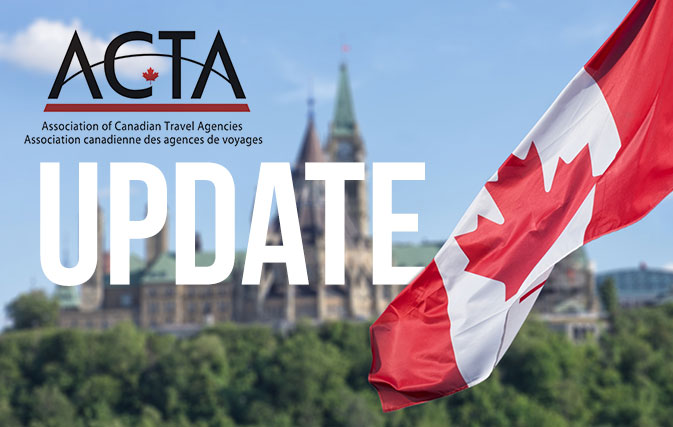TORONTO — ACTA couldn’t make it any more clear.
The association’s 7-point plan for travel agency and travel agent support and recovery “comes out at every single meeting with the government,” ACTA President Wendy Paradis told Travelweek in a recent interview.
For months now, since the very start of the pandemic, ACTA has been lobbying on behalf of travel agents and travel agencies as the retail travel industry works to survive the blunt force trauma of the pandemic, unprecedented in scope and with no end yet in sight.
Those 7 priorities are:
1. Extension of the Canada Recovery Benefit (CRB) and Employment Insurance (EI) programs
2. Aid to cover commission recall
3. Increase and extension to Canada Emergency Wage Subsidy (CEWS)
4. Amendments to and extension of the Canada Emergency Rent Subsidy (CERS)
5. Ensure HASCAP and other support programs such as the Regional Relief and Recovery Fund (RRRF) and the Canada Emergency Business Account (CEBA) loan programs, work for all ‘hardest hit’ businesses including home-based, independent travel agent businesses
6. Work with industry to develop clear criteria for re-opening borders and easing travel restrictions, through rapid testing and establish vaccine documentation options to reduce or eliminate the 14-day quarantine
7. Incentivize travel through tax credits and promote travel agents

ACTA President Wendy Paradis
ACTA’s entire plan can be found here.
Our interview with Paradis comes as the industry waits to see if the airline industry bailout will be included in the April 19 federal budget – and more importantly for agents, if that bailout will protect commissions from what could be up to $200 million in commission recalls, in the wake of mass airfare refunds.
After all of ACTA’s tireless work on behalf of travel agents and travel agencies, we mentioned to Paradis that now all ACTA could do was wait.
“There’s no waiting,” answered Paradis. “We have been intensely lobbying for a year now. We can’t sit back and wait. We are in the middle of their discussions all the time. We are meeting with everyone we can, to ensure that travel is part of that budget. This is budget season.”
In February 2021 Paradis indicated that in ACTA’s talks with the Ministry of Finance, which had taken over the bailout discussions from the Ministry of Transport, the narrative had moved from ‘if’ to ‘how’ travel agent commission will be protected from recalls. It was a glimmer of good news for travel retailers in an extremely difficult year.
This week ACTA put out an urgent call for travel agents to complete a 5-minute survey that will make a big difference for lobbying efforts, says Paradis.
Responses are needed by the end of this week. The survey is gathering travel agent feedback on the financial sustainability of the retail travel sector and what it will look like without expanded and enhanced aid past June.
The survey can be found here: https://www.surveymonkey.com/
Our eight questions for Paradis, and her responses, are below…
Q. What are you hearing from agents right now?
Paradis: “The number one thing we’re hearing from all travel advisors is that the situation is still a crisis, a catastrophe. We are hearing that message loud and clear. Revenues are still down 90 – 100% for most travel agents and travel agencies. That said, there is some interest in future travel, for 2022 and 2023 and some in later 2021. From agency owners and leaders, we’re hearing that 90% of travel agents across Canada are furloughed or receiving aid and have been for almost a year. The vast majority of independent travel advisors are on CRB.”
Q. What are you hearing from the federal government?
Paradis: “Where we are now, and what we’re saying to the government, is that we need to start having real conversations about a recovery plan. The financial situation for travel agents is dire. We need enhanced aid to survive. We’re going to need aid right until the end of 2021, or 90 days after travel restrictions are eased.
“When we’re talking to the federal government, they’re not challenging us, they certainly understand the impact that the pandemic has had on the travel industry. But they haven’t used the words ‘sector-specific support’.
“When, not if, consumer refunds are mandated, our formal ask is that any funding that’s given must include travel agent commission protection. Agents are facing up to $200 million in commission recalls. Only 15% has been recalled so far.
“The government has told us, ‘We hear your message loud and clear. We understand the impact. Please know your concerns are part of every discussion’.
“ACTA had a meeting with Transport Minister Omar Alghabra on March 30 and he said the travel restrictions will be lifted based on what’s going on. He said ‘we can’t give you a date’.
“There is light at the end of this very dark tunnel, even if it’s not moving as quickly as we’d like. The rollout of the vaccine is critical to us recovering.”
Q. Do you think the April 19 federal budget will include the airline industry bailout announcement?
Paradis: “I would have expected it would have happened much earlier. In my opinion, I would expect that it will.”
Q. What’s your take on vaccination passports?
Paradis: “Several industry groups – ACTA is a member of all of these – like the Coalition of Hardest Hit Businesses, the Canadian Travel and Tourism Roundtable, and Travel Again – are all talking about this issue, about digital health certificates (DHCs).
“The controversy lies in where they might be applied. But in my opinion, when it comes to restarting international travel, DHCs are going to be vital. Japan just started a DHC pilot project. The EU has its Digital Green Pass proposal. The WHO already has standards in place.
“This is happening. These tools already exist and they’ve existed for decades. When I was a travel agent, I remember checking [IATA’s] Timatic to see which countries required yellow fever vaccinations. It’s the WHO’s International Certificate of Vaccination. We all know it as ‘the Yellow Card’.
“Now the question is, how do we have a harmonized approach? I think there will be harmonization. There just might be more than one tool. It’s expected there will be a lot of tools out there. IATA’s Travel Pass is one of them. But in the background they’ll all be doing the same thing.”
Q. In addition to the CEWS and CERS extensions, and the bailout talks, what are ACTA’s top priorities right now?
Paradis: “The two priorities we’re focusing on right now are travel agency solvency, and the restart of the travel industry.
“We have to focus on travel agency solvency to ensure there is a travel industry going forward. We have been intensely lobbying for a year. We’re lobbying every province as well. The waiving of TICO fees in Ontario, and OPC fees in Quebec, we were happy with that. We weren’t as fortunate in B.C., but new grants in B.C. can be used towards the fees. ACTA reached out to all of its members in B.C. to let them know they can tap into that money.
“As for restarting travel, the governments are very worried about the variants. They truly believe now is not the time to be travelling outside of Canada. We feel that while now is not the time to travel, now is the time to start planning the restart.”
Q. Just like the pandemic has changed the way people see travel agents, it’s also changed the way many in the travel industry see ACTA. ACTA has done an incredible job advocating for travel agents over the past year. What are some of your proudest moments over the past 12 months as a member of the ACTA team?
Paradis: “The amount of aid we’ve been able to get into the hands of travel agents and travel agencies, that’s quite an accomplishment. Also the way we leveraged our relationships with other associations to help secure that aid. CEWS was going to be 10%. We were able to get 75% by leveraging those relationships. The power of working together in this incredible time of need and leveraging those relationships has been a huge win for travel agents, travel agencies and the rest of the travel industry.
“ACTA and especially ACTA’s VP Advocacy and Member Relations, Heather Craig-Peddie, have built up very strong relationships with key government ministries and key policy developers. Being able to pick up the phone and talk to them has been huge for us. Heather has done an amazing job.
“Also the way that travel agents, agency managers, owners and other agency leaders have come together, we are mobilized. There have been thousands of meetings. There have been tens of thousands of letters written, from travel agents, agency managers, everyone. I think it is incredible, the engagement, the amount of work our community has done to get loud and noticed. We are everywhere.”
Q. Is ACTA membership over the past year up, down or steady? Is lack of funds for membership fees a challenge for struggling agencies?
Paradis: “The vast majority of ACTA members have renewed their membership. That’s incredible. They also said, ‘whatever I can do, call on me’. They’ve not only paid but they’re also giving their time, and we really appreciate that. All travel agents and travel agencies benefit from ACTA’s advocacy, whether they’re members or not. In order to continue the work that we do, we need as many travel agent members as possible.”
Q. What is ACTA’s message for agents?
Paradis: “With the vaccinations, and the testing, and the discussions about digital health certificates (DHCs), I really believe there is light at the end of the tunnel. I do believe we’ll start progressing faster than we have been. Recovery is coming. Because people want to travel, they want to be vaccinated before they travel and they want to work with a professional, the role of the travel agent is going to be more important than ever.”


